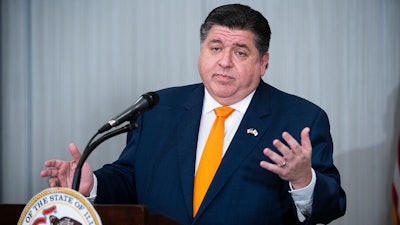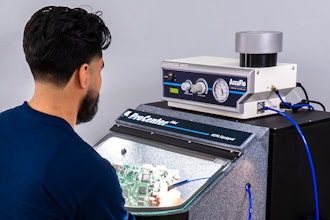
SPRINGFIELD, Ill. (AP) — A mental health crisis among children in Illinois will be fought by streamlining and easing access to necessary treatment and coordinating between six separate state agencies, Gov. J.B. Pritzker plans to announce Friday.
A report examining the capacity and condition of Illinois' response to behavioral health in young people has been in the works for nearly a year. It sketches avenues to help families understand mental illness, then make it easier for them to get required care without wrangling among disparate state agencies. A copy of the report was obtained in advance by The Associated Press.
"It's all really geared toward creating an experience for families, where the boundaries between those different state agencies that are there to serve them are less visible," said Dana Weiner, whom Pritzker tabbed for the initiative. She is on loan from the Chapin Hall Center for Children at the University of Chicago, where she is senior policy fellow.
"What families (should) experience is a simplified, centralized, clear way to get access to services to understand what their children are struggling with and to identify the things that might help address those challenges," Weiner.
The deterioration of mental health among children predates the COVID-19 pandemic. But with the spread of the coronavirus the Centers for Disease Control and Prevention in 2021 found 44% of American children had depressive episodes lasting at least two weeks and nearly half had thought about suicide, according to the report.
Friday's announcement marks the beginning of work to ready the plan for implementation, a report on which Pritzker expects by October. There's $22.8 million in the governor's fiscal 2024 budget proposal to complete the planning.
The report identifies technological, practical, legislative and other means for marshaling the expertise among the Departments of Human Services, Children and Family Services, Juvenile Justice, Healthcare and Family Services, Public Health and the State Board of Education.
The program must be agile for responding to changing needs, given the volatility of mental illness, the report says. It suggests widespread screening of children which might telegraph future suffering and emphasizes the necessity of early intervention.
Recognizing problems quickly is critical, Weiner said. The U.S. Surgeon General discovered in a 2021 study that on average, there is an 11-year gap between recognizing a child's potential mental health issue and that child getting treatment.
"I'm optimistic because in all of the cases that I've listened to and worked on over the last year, there are opportunities to intervene earlier when problems aren't as severe," Weiner said. "We can reduce the number of false starts or missed opportunities."
At the same time, the report recognizes the need to provide incentives to draw people to the field, both by making education more attainable but also drawing upon paraprofessionals or aides to conduct critical work which doesn't need extensive formal education. With worker shortages hampering many sectors, finding qualified people to fill crucial roles might be one of the effort's bigger challenges.
But help is available in existing "touch points" in children's lives — teachers and pediatricians, for example, as well as parents, Weiner said. It doesn't mean the teacher is the health care provider, but is the recipient of the necessary information to be able to refer a child who needs help.
Asked for her message to parents of troubled children, Weiner said, "We are going to make this easier for you to care for your children and to obtain needed services as well as important information to help you understand how to keep your kids healthy and strong."






















